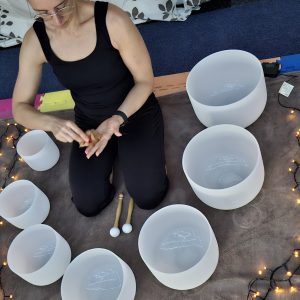Sound Bath with Jane- Sun 21st Dec -4pm-5pm
£10.00
Join Jane for a gentle, holistic sound bath on Sun 21st Dec, 4pm-5pm at Kimbles, Moira Furnace. classes are limited to 10 people
8 in stock (can be backordered)
Sound Bath for Deep Rest & Renewal (Adults only)
With Jane Meer – Freestyle Yoga, Fitness Pilates & Group X Instructor (20+ Years’ Experience)
Join us for a deeply soothing Sound Bath experience, guided by the gentle and compassionate presence of Jane Meer, a highly experienced holistic yoga and fitness teacher with over two decades of delivering quality, heart-centered classes.
♀️ Whether you’re looking to unwind, release stress, or simply reconnect with yourself, this one-hour session offers a peaceful sanctuary for rest and restoration.
This is more than relaxation – It’s deep energetic recalibration.
Through the healing vibrations of crystal bowls, chimes and voice, this sound bath you can expect a calming, meditative journey with healing sound frequencies designed to:
-
Soothe the nervous system
-
Calm the mind
-
Support emotional balance and inner stillness
When: Sunday 21st Dec| 4pm-5pm
Where: Kimbles, Studio 5, Moira Furnace
Spaces: Limited to 12 participants for an intimate and nourishing experience
What to Bring: A blanket, a cushion, water and wear comfortable clothing (optional eye mask)
✨ No prior experience needed — just come as you are.
Reserve your place now and give yourself the gift of gentle, holistic care with Jane Meer.
***
Sound baths are a form of meditative therapy that use instruments like gongs, singing bowls, and chimes to create soothing sound vibrations that help promote relaxation, reduce stress, and support emotional and physical well-being.
Key Benefits of a Sound Bath :
-
1. Deep Relaxation & Stress Reduction
The gentle vibrations from sound instruments can help lower cortisol (stress hormone) levels and calm the nervous system.
-
Reference: Landry, J. M. (2014). “Physiological and psychological effects of yoga and sound meditation.” Health Psychology Research.
Study participants reported reduced tension and anxiety after sound meditation sessions.
2. Improved Sleep Quality
Sound baths can promote better sleep by easing physical tension and mental chatter.
-
Reference: Garcia-Argibay, M., et al. (2019). “Effects of binaural beats on creativity and cognitive performance.” Psychology of Music.
Auditory stimulation has been shown to improve relaxation and support healthy sleep patterns.
3. Enhanced Mood & Emotional Balance
Sound therapy can positively affect mood, reducing symptoms of depression and anxiety.
-
Reference: Goldsby, T. L., et al. (2017). “Effects of singing bowl sound meditation on mood, tension, and well-being.” Journal of Evidence-Based Integrative Medicine.
Participants experienced significantly less tension, anger, fatigue, and depressed mood after sound meditation.
4. Improved Focus and Mental Clarity
The repetitive and harmonic nature of sound can enhance mindfulness and mental clarity.
-
Reference: Braboszcz, C., et al. (2010). “Increased gamma brainwave activity in experienced meditators.” PLoS One.
Meditation practices, including those involving sound, support cognitive function and mental focus.
5. Energetic & Physical Rebalancing
Sound vibrations can affect the body at a cellular level, helping to release energetic blockages and restore balance.
-
Reference: Perry, C. (2012). “Sound healing practices.” Journal of Holistic Nursing.
Sound therapy can facilitate a sense of harmony in the body and mind by influencing energy flow.
Here are some important precautions and considerations to keep in mind before participating in a sound bath:
⚠️ Sound Bath Precautions
1. Medical Conditions
-
Epilepsy or seizures: Certain frequencies or sudden loud sounds may trigger seizures in sensitive individuals.
-
Heart conditions or pacemakers: Vibrations and electromagnetic fields from instruments may interfere in rare cases—consult your doctor.
-
Hearing sensitivity or tinnitus: Some participants may find certain tones overstimulating or uncomfortable.
2. Pregnancy
-
Sound baths are generally safe during pregnancy, especially in the second and third trimester, but:
-
Avoid very loud or low-frequency instruments placed close to the body.
-
Always check with a healthcare provider before attending.
-
3. Mental Health Considerations
-
People with PTSD, anxiety disorders, or trauma may find deep meditative states unsettling or triggering.
-
Choose a practitioner experienced in trauma-sensitive practices if this applies to you.
-
Inform the facilitator if you’re feeling vulnerable.
-
4. Group Settings
-
Shared spaces may not suit everyone—some people may feel overwhelmed or overstimulated by others’ energy or reactions.
-
Personal space may be limited, so consider your comfort level with proximity to others.
5. Overstimulation or Emotional Releases
-
It’s common to experience strong emotions, tears, or vivid thoughts. This is natural, but be prepared and allow time to ground yourself afterwards.
6. Hydration & Rest
-
Sound work can be detoxifying. Drink water before and after the session.
-
You might feel spaced out, tired, or deeply relaxed—don’t plan anything demanding immediately after.
✅ Recommendations:
-
Arrive with an open mind, but listen to your body.
-
Let the facilitator know about any health conditions or sensitivities.
-
-






Reviews
There are no reviews yet.